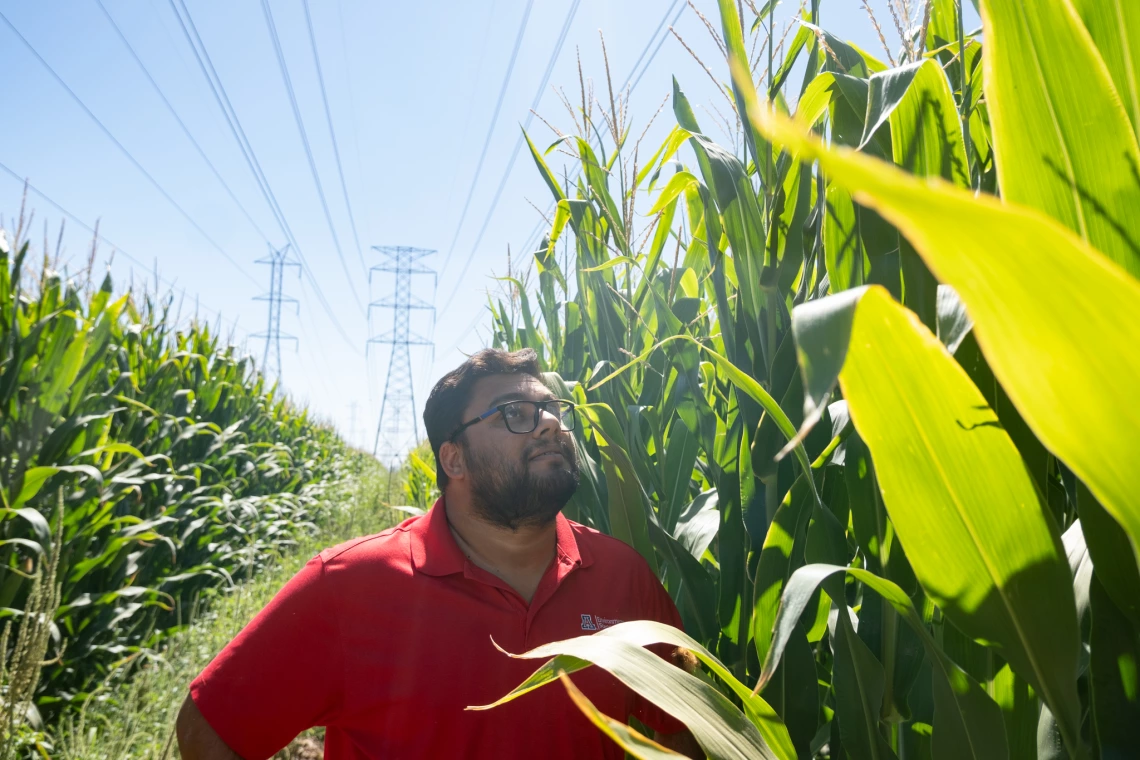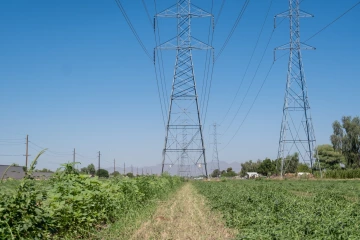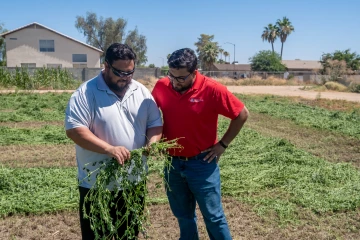On the farm or in the lab, Debankur Sanyal is a soil doctor
As a recently hired Soil Health Extension Specialist, Debankur Sanyal connects with growers across the state to help maintain healthy and profitable soil

Debankur Sanyal works with community members to study how soil health affects plant systems, such as the Arizona Tractor Association’s urban farm in Glendale.
Jake Kerr
Soil health, like human health, is a complex system with a seemingly endless array of contributing factors. Instead of medical doctors, soil health requires scientists like University of Arizona’s Debankur Sanyal to diagnose problems and prescribe innovative solutions.
Sanyal is one of the Department of Environmental Science’s newest faculty members, starting in the beginning of 2022 as a statewide Soil Health Extension Specialist at the Maricopa Agriculture Center. With just under two years under his belt, Sanyal has already connected with over 50 growers, and taken soil samples from over 250 fields.
His drive, according to Sanyal, comes from the gratitude he receives after a successful project.
“With everything I do, I try to make personal connections so I can help farmers,” Sanyal said. “When they text me pictures of their fields and tell me how thankful they are, that gives me immense pleasure. That’s what pushes me.”
One farmer, Ed Savage of Arizona Tractor Association’s urban farm in Glendale, partners with Sanyal to test out innovative cover crop methods to reduce the amount of fertilizer and chemical sprays necessary.

Ed Savage's urban farm in Glendale, Arizona is squeezed between two neighborhoods with an overarching powerline overhead.
Jake Kerr
Ed Savage's urban farm in Glendale, Arizona is squeezed between two neighborhoods with an overarching powerline overhead.
As the farm is squeezed between two neighborhoods, Savage said his main concern is reducing his environmental and human health impacts. By utilizing cover crops, he is cutting down on fertilizer use, significantly decreasing the amount of nitrogen releasing into the atmosphere and leaking into surrounding groundwater.
“I do everything I can to protect the groundwater, because I see kids running around here,” Savage said. “These families are living off groundwater, so we want to minimize what we are putting out here to protect the community at large.”
According to Sanyal, getting more than 30 percent of nitrogen to stay in soil when using synthetic fertilizer is difficult, leading to more than 70 percent of nitrogen turning into air and water pollution. By using cover crops, however, Sanyal said they can use those plants to hold on to the excess nitrogen until the farmers need it.
“Cover crops are like catch-and-release fishing,” Sanyal said. “They catch the nitrogen one season and then next season they are incorporated into the soil, where the biomass decomposes and releases the nitrogen again when other crops can actually benefit from it.”
This system can result in fewer fertilizer applications for farmers like Savage, who said he now uses 40 percent less fertilizer than in the past.
A major component of Sanyal’s work is providing logistically practical solutions to farmers. Science, according to Sanyal, can often neglect that side of research.
“We always think about how science can solve many challenges, but one thing we do not always think about is how farming and many other fields are businesses,” Sanyal said. “Science can tell us what is happening in the environment, but it can’t solve other issues of business. So that’s why we need to work with farmers to find solutions that can actually be used.”

Surrounded by family homes, Debankur Sanyal and Ed Savage inspect a recently plowed field on Savage's urban farm in Glendale, Arizona
Jake Kerr
This perspective on business-minded research came to Sanyal during his postdoctoral position at South Dakota State University, where he worked with several farmers across the state. Sanyal said through reading scientific papers he found a solution to one farmer’s cover crop issue, but when he offered it, the farmer rejected it.
“The farmer said, ‘Debankur, I don’t have the money to buy all this equipment and my farm doesn’t have the ability to use it even if we did,’ and that’s when it struck me,” Sanyal said.
Changing scientific approaches isn’t the only difference Sanyal wants to make. He said many farmers also need to change their mindset about soil health, as many believe one tool or product can fix all of their challenges when in reality, it is much more complicated than that.
Creating healthy soil, Sanyal joked, is comparable to him preparing for a marathon.
“If you asked me to run a marathon right now, I’d die because I am not ready and it will take me some time to get ready,” Sanyal said. “Soil health is the same way, it is a complex system that cannot be fixed with a single product over a short period of time.”
Sanyal hopes to educate farmers on what soil health really is and demonstrate how it can be fixed through innovative methods and a holistic approach involving water, air, nutrients, microbiomes, and a suite of other factors.
Although the changes he makes now may be small, Sanyal admits, he believes the lasting impact on farming practices will be much larger.
“I cannot produce food but I can impact people who do, and farming is a community where the technology is transferred throughout generations,” Sanyal said. “If we impact one generation, we are probably impacting many generations after.”
Sanyal’s expertise is being called upon throughout the state, including a recent $70 million project focused on growing and producing guayule as a climate-smart crop to produce natural rubber.
Whether it is on a small urban farm or in a multimillion-dollar project, Sanyal continues to leave the soil he touches healthier than before.
